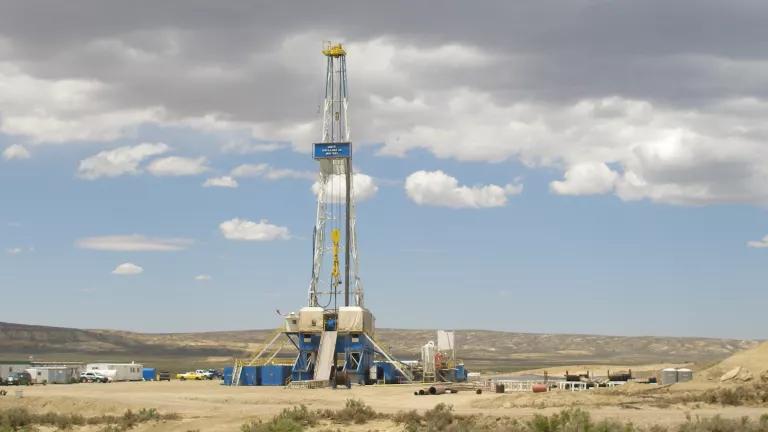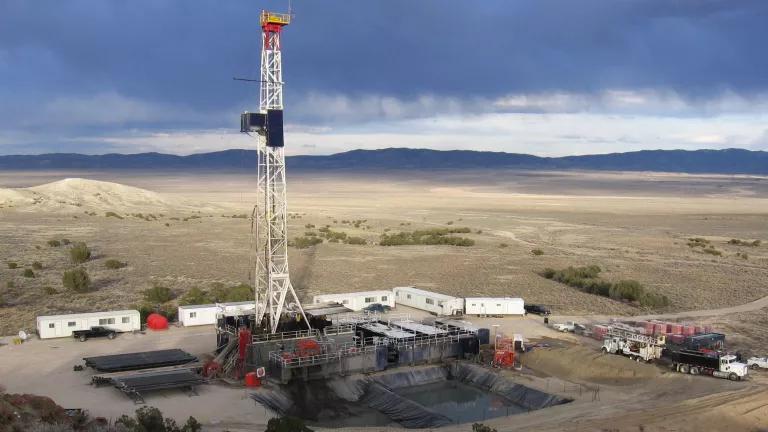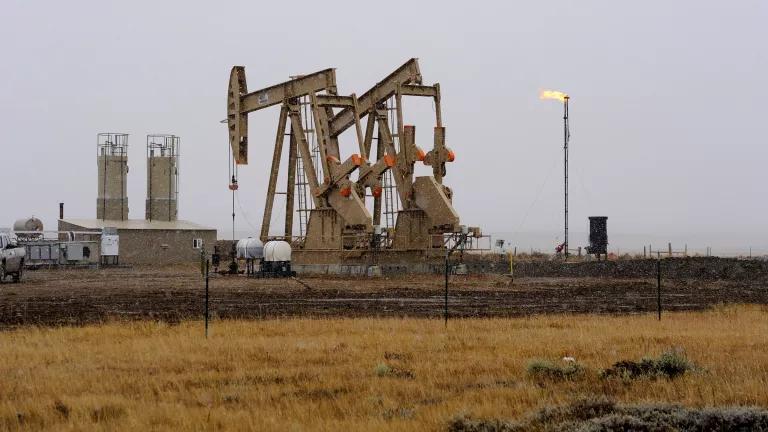
Mountain Valley Pipeline construction
When President Biden signed the Inflation Reduction Act, he proudly proclaimed that the new law will reduce pollution, make clean energy more affordable, and prioritize environmental justice. The new law also provides more than $1 billion for federal agency staffing and resources to facilitate environmental reviews of infrastructure projects.
In the wake of this monumental achievement, however, new legislation is now being proposed that would do the opposite: upend bedrock environmental laws to promote dirty fossil fuels at the expense of low-income frontline communities and communities of color, perpetuating a sordid history in our country where dirty industries harm overburdened, vulnerable communities by attacking their right to participate in decision-making about projects built in their neighborhoods through the review process established by the National Environmental Policy Act (NEPA).
Congress should fully reject any efforts to pass such harmful legislation.
What the Permitting Bill Proposals Say
We don’t know the full details of this proposed permitting bill because it hasn’t been introduced in Congress yet, but we’ve seen two related documents. The first is a draft of legislative language with a watermark of “API”—the American Petroleum Institute, the lead lobbyist for the oil and gas industry. The second, slightly different and less detailed version, is a one-page outline of a proposed bill, that Senator Joe Manchin (D-WV) released.
Overall, the intent is clearly to limit public participation and meaningful review by federal agencies, states, Indigenous tribes, the public, and the courts. Such legislation would be a giveaway to the very industries that are poisoning our communities and causing the climate crisis.
The Proposals Are Bad Judicial Policy
Both proposals would change how the courts review legal challenges to energy projects.
For example, the API draft would shorten the time allowed to file a lawsuit challenging energy projects to 150 days. Currently, parties have up to six years to file some challenges, including those under NEPA. Permitting decisions are highly technical and can amount to hundreds of pages. The reality is that reviewing the potential impacts of a technical permitting decision takes time, particularly for individual citizens who may not have internet access, let alone access to technical experts, and may not find out about a proposed project right away. Language limiting lawsuits would fall hardest on low-income frontline communities and communities of color. We also anticipate that such a law could actually delay energy projects because some parties will rush to file lawsuits to meet the deadline, without having the time to fully explore the merits of their cases.
The draft language would also limit the time a federal agency has to correct an error identified in a court case. Such time limits will prevent an agency from conducting all the analysis it needs, leading to more problematic agency decisions, thereby creating even more litigation and delay.
Rubber Stamping of the Mountain Valley Pipeline Is Wrong
Another example of the harms in these proposals is in Senator Manchin’s summary, which would require federal agencies to issue permits for the Mountain Valley Pipeline (MVP), even if the permits ignore community input and violate federal law. MVP was originally issued permits under the Trump administration, when construction began, and is now approximately 56% complete. During construction, inspectors documented more than 1,500 instances of alleged violations of water quality regulations. The permits issued under the Trump administration were eventually overturned in federal court because they violated our federal environmental laws and threatened clean water, the ecosystem of a National Forest, endangered species, and local communities and farms, without any demonstrated need.
The Manchin summary would force federal agencies to reissue the permits. To complete MVP would entail construction to cross more than 400 sensitive water bodies, such as streams, rivers, lakes and wetlands, most of which would take place in Virginia. It would also interfere with federal judicial review of any of these permits, restricting the rights of impacted communities.
The Proposals Weaken Other Environmental Safeguards
Additional flaws in these two proposals are many. For example, they would weaken protections under the Clean Water Act, compared to regulations proposed by the Biden administration. The Environmental Protection Agency is in the middle of revising regulations that would improve Clean Water Act reviews of state and tribal decisions, but the dirty permitting proposals attempt to short-circuit this regulatory process through legislation. The proposed legislation would impair a state or tribe’s ability to make informed decisions about clean water permits for energy infrastructure projects. Rather than standing in the way of thoughtful state and tribal clean water reviews, Congress should defer to the ongoing Biden rulemaking process.
In addition, the API draft seeks to reduce requirements for agencies to consider alternatives that are less harmful to the environment or human health, allow projects to be approved with little or no public input, transparency or environmental impact analysis, and prioritizes dirty fossil fuel projects.
There is no need for new legislation to rubber stamp energy projects
The leaked permitting proposals we’ve seen suggest a false narrative that we need new legislation to help advance new energy projects. In truth, rubber stamping dirty energy projects will harm our efforts to fight climate change and meet climate targets. It will expose families to hazards and harms that falls hardest on low-income frontline communities and people of color, dim the voices of those most impacted by destructive projects by shutting them out of the review process, and deepen our dependence on the fossil fuels that are driving the climate crisis.
The 2022 Inflation Reduction Act and the 2021 Infrastructure Investment and Jobs Act (also known as the bipartisan infrastructure bill) already established clear pathways for energy deployment. Indeed, the Inflation Reduction Act includes more than one billion dollars for agency staffing and resources to facilitate environmental reviews. Congress has already done its work and should say no to any new legislation to reverse its previous progress. Instead, Congress should focus on the work that the American people need right now, such as the Environmental Justice for All Act, which would help remedy, instead of perpetuate, a long legacy of harm by ensuring the fair treatment and meaningful involvement of all people – regardless of color, culture, national origin, or income – with respect to the development, implementation, and enforcement of health and environmental laws, regulations, and policies.






